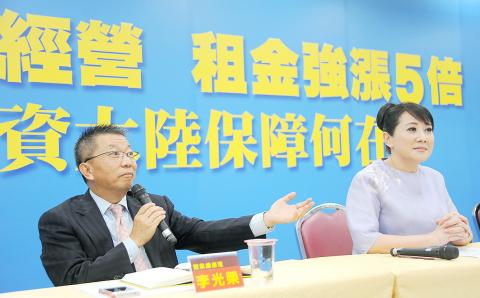Far Eastern Group (遠東集團), which operates Pacific Sogo Department Stores (太平洋崇光百貨) in Taiwan and China, yesterday urged the semi-government Straits Exchange Foundation (SEF) to quicken its pace in signing an investment protection agreement with its Chinese counterpart to safeguard the rights of local firms with Chinese operations.
The group said it failed to get legal protection from Chinese authorities when facing unreasonable rent hikes or other breaches of contract at two of its Chinese department stores.
The group currently operates 11 department stores in China, but two of them have had difficulty in their operations because the landlords had broken their contracts by increasing rents to a stunningly high rate, the group said.

Photo: Liu Hsin-de, Taipei Times
The landlord for the group’s store in Dalian, Liaoning Province, has raised the rent several times, breaking contract terms, and then forced the group to vacate some of the rented floors so the landlord could rent them out in smaller units to make more money, Tai Yin-pen (戴蔭本), operation general manger of the group’s retail division in China, said at a media briefing yesterday.
“This is a common problem faced by all Taiwanese companies with operations in China. Far Eastern Group, which is a big group, faces blatant breaches of contract by landlords. Imagine the situation of small and medium enterprises,” Pacific Sogo chairperson Sophia Huang (黃晴雯) said.
The SEF should include immediate protection to Taiwanese companies operating in China, especially immediate protection against breach of contract, when it returns to the negotiating table to sign an investment protection agreement with its Chinese counterpart, Huang said.
Huang did not insist that disputes be arbitrated in a third area, as some of her peers had proposed.
Recently the group’s Dalian landlord, which is a mall operator, tried to raise the department store’s yearly rent from 15.8 million Chinese yuan (US$2.48 million) to 39 million yuan and demanded that the group pay a lump sum for the remaining nine years at once, a total of 350 million yuan, Pacific Sogo president Tu Chin-sen (杜金森) told reporters.
Moreover, the landlord occasionally switches off electricity to the Pacific Sogo department store without notice, disturbing operations and causing losses estimated at more than NT$10 million (US$334,000) over the years, Tai said.
The group said it sought help from the local government, but local authorities gave it the cold shoulder because they said it was a business dispute and they could not interfere with the landlord’s right to switch off electricity.
Another Pacific Sogo store in Chengdu, Sichuan Province, faces a similar situation where the landlord, which is also a mall operator, is trying to quintuple the rent, Tu said.
The Chengdu City Government has stepped in to try and settle the dispute, he said.

Real estate agent and property developer JSL Construction & Development Co (愛山林) led the average compensation rankings among companies listed on the Taiwan Stock Exchange (TWSE) last year, while contract chipmaker Taiwan Semiconductor Manufacturing Co (TSMC, 台積電) finished 14th. JSL Construction paid its employees total average compensation of NT$4.78 million (US$159,701), down 13.5 percent from a year earlier, but still ahead of the most profitable listed tech giants, including TSMC, TWSE data showed. Last year, the average compensation (which includes salary, overtime, bonuses and allowances) paid by TSMC rose 21.6 percent to reach about NT$3.33 million, lifting its ranking by 10 notches

Popular vape brands such as Geek Bar might get more expensive in the US — if you can find them at all. Shipments of vapes from China to the US ground to a near halt last month from a year ago, official data showed, hit by US President Donald Trump’s tariffs and a crackdown on unauthorized e-cigarettes in the world’s biggest market for smoking alternatives. That includes Geek Bar, a brand of flavored vapes that is not authorized to sell in the US, but which had been widely available due to porous import controls. One retailer, who asked not to be named, because

SEASONAL WEAKNESS: The combined revenue of the top 10 foundries fell 5.4%, but rush orders and China’s subsidies partially offset slowing demand Taiwan Semiconductor Manufacturing Co (TSMC, 台積電) further solidified its dominance in the global wafer foundry business in the first quarter of this year, remaining far ahead of its closest rival, Samsung Electronics Co, TrendForce Corp (集邦科技) said yesterday. TSMC posted US$25.52 billion in sales in the January-to-March period, down 5 percent from the previous quarter, but its market share rose from 67.1 percent the previous quarter to 67.6 percent, TrendForce said in a report. While smartphone-related wafer shipments declined in the first quarter due to seasonal factors, solid demand for artificial intelligence (AI) and high-performance computing (HPC) devices and urgent TV-related orders

MINERAL DIPLOMACY: The Chinese commerce ministry said it approved applications for the export of rare earths in a move that could help ease US-China trade tensions Chinese Vice Premier He Lifeng (何立峰) is today to meet a US delegation for talks in the UK, Beijing announced on Saturday amid a fragile truce in the trade dispute between the two powers. He is to visit the UK from yesterday to Friday at the invitation of the British government, the Chinese Ministry of Foreign Affairs said in a statement. He and US representatives are to cochair the first meeting of the US-China economic and trade consultation mechanism, it said. US President Donald Trump on Friday announced that a new round of trade talks with China would start in London beginning today,